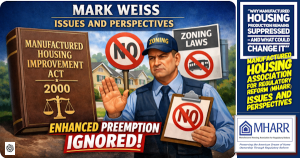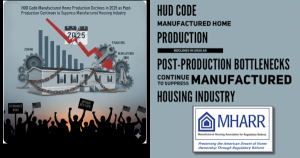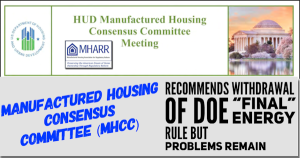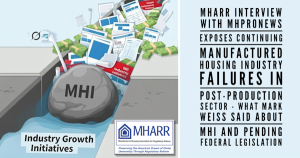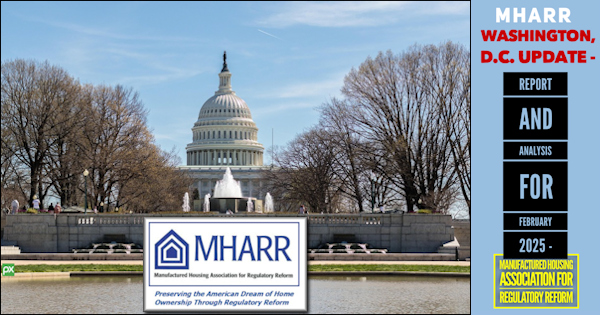
REPORT AND ANALYSIS
IN THIS REPORT: FEBRUARY 19, 2025
- DOGE SET TO HIT HUD
- UNILATERAL MHI CONCESSIONS MUST BE REJECTED
- MHARR ENGAGES TRUMP APPOINTEES ON SUBSTANCE
- MH PRODUCTION UP IN ‘24 – STILL BELOW HISTORICAL NORMS
- HUD IGNORES CONTINUED ZONING ATTACKS ON MH
- HOMELESSNESS SPIKES IN 2024 AS AFFORDABILITY PLUMMETS
- CFPB TARGETED BY TRUMP ADMINISTRATION
- STATES SUE HUD OVER APPROVAL OF IECC
DOGE SET TO DESCEND ON HUD
The full weight and impact of President Trump’s Department of Government Efficiency (DOGE) is about to descend on the U.S. Department of Housing and Urban Development (HUD). First, according to press reports, HUD Secretary Scott Turner has established a DOGE Task Force at HUD. In a public statement, Secretary Turner said: “Thanks to President Trump’s leadership, we are no longer in a business as usual posture and the DOGE Task Force will play a critical role in helping to identify and eliminate waste, fraud and abuse and ultimately better serve the American people. We have already identified over $260 million in savings, and we have more to accomplish.” (Emphasis added). The Secretary added, “The American taxpayer is no longer writing a blank check for federal contracts and programs.”
Simultaneously, DOGE itself is separately reviewing contracts issued by HUD, as it moves to reduce the federal workforce and government spending. In a message sent to HUD personnel, DOGE has requested immediate information on more than 370 HUD contracts. Again, according to media reports, a HUD proponent for each contract was asked to “personally vouch” for “whether the contract is critical to HUD, if the associated contractor is competent and performing up to expectations, and if the contract includes a diversity, equity and inclusion component.” The value of the contracts under question ranges from more than $115 million to just $3,000.
Further, news sources are reporting that HUD/DOGE will discharge up to half of the Department’s current workforce, with an emphasis on HUD’s Office of Fair Housing and Equal Opportunity, its Office of Policy Development and Research (PD&R) and its office of disaster recovery.
While the precise HUD contracts and functions being reviewed by DOGE are not yet known, MHARR, in communications with Secretary Turner, has already called for a thorough waste, fraud and abuse review of the HUD manufactured housing program with a specific emphasis on:
- Its fifty-year dependence on the same “monitoring” contractor (albeit under varying corporate names);
- Its use of de facto sole source procurements to continue that contract without legally-mandated sole source safeguards;
- Its use of the “monitoring” contractor to perform inherently governmental functions;
- Its mismanagement of the program including, among other things, manipulation of the statutory Manufactured Housing Consensus Committee (MHCC) and MHCC appointments;
- Its consistent favoritism toward the industry’s largest manufacturers; and
- Its failure to federally preempt discriminatory zoning exclusion of manufactured housing in accordance with existing federal law, among other things.
Even though the regulation of manufactured housing construction and safety must be – and must remain – federally regulated, due to the fundamentally interstate character of manufactured housing production, marketing, sales and installation (with affordability ensured by uniform federal standards, uniform federal enforcement and federal preemption), the federal manufactured housing program has suffered from endemic mismanagement and contract abuse, which can, should and must be remedied for the benefit of American homebuyers. In the face of an affordable housing crisis, America cannot afford a dysfunctional HUD program. MHARR, accordingly, will continue to press for full accountability in connection with the federal manufactured housing program.
MHI TEES-UP A LOSER FOR THE INDUSTRY AS COMPETITORS BENEFIT
The Manufactured Housing Institute’s (MHI) ill-advised unilateral surrender of the federally-regulated HUD Code industry’s unique “affordability” and factory-built exceptionalism, increasingly appears to be a marketing and advocacy loser that should be rejected. While the industry, since its inception, has produced inherently “affordable” factory-built homes that can be accessed by families and individuals at every rung of the economic ladder without the need for costly government subsidies, and the term “affordability” has itself been enshrined in federal manufactured housing law (and repeatedly emphasized by both President Biden and President Trump) MHI, in recent years, has seen fit to virtually abandon the language of “affordable” factory-built manufactured housing, in favor of the meaningless term “attainable” housing. Unfortunately, this action, by a national industry organization, principally benefits the industry’s more costly competitors, while HUD Code manufactured housing production remains mired in a decades-long slump.
In moving away from “affordability” as the centerpiece characteristic of factory-built manufactured housing for marketing and advocacy purposes, MHI is following the lead of its largest manufacturer, Berkshire-Hathaway owned Clayton Homes, Inc. (Clayton), which produces a wide spectrum of site-built and factory-built housing, including manufactured homes as just one element. For several years now, Clayton has diversified into site-built construction, non-HUD Code factory-built construction, “net zero energy” manufactured homes and so-called “cross-mod” manufactured homes. There has also been – and continues to be – related activity, principally by MHI, to blur the lines of distinction and demarcation between these various types of construction and federally regulated mainstream, affordable, non-subsidized manufactured housing. In each instance, though, these other types of homes are more costly than mainstream manufactured homes. Apparently as a result, therefore, Clayton – and MHI – have both moved away from the well-know, well-established, and well-understood concept of “affordability,” which Congress chose to expressly include in the Manufactured Housing Improvement Act of 2000, in favor of the subjective, meaningless label of “attainable” housing, as previously addressed in some detail in the November 2023 issue of MHARR Issues and Perspectives entitled, “What’s in a Name? – Everything.”
But the dangers for the HUD Code industry (including chaos and confusion in Washington, D.C.) posed by such a unilateral pseudo-abandonment of the concept and language of affordability – as first addressed in that analysis – have only been intensified and aggravated by more recent developments. It cannot be stressed enough that despite the endemic mismanagement of the HUD manufactured housing program, manufactured homes – which are routinely shipped across state lines – must be and must remain federally regulated. However, that has not stopped the International Code Council from insinuating efforts to transfer regulatory authority over manufactured homes to state and/or local authorities. Even worse, in the age of DOGE and extensive federal government downsizing, that message might carry more weight than it has in the past.
All of which is only more reason for the industry to renew its emphasis on the inherent affordability of manufactured housing and the fundamental pillars of federal law which ensure and maintain that affordability – i.e., uniform federal standards; uniform federal enforcement and robust (enhanced) federal preemption. As MHARR will emphasize soon in a more detailed and pointed analysis, anything different could spell disaster for the industry and American consumers of affordable housing.
MHARR TARGETS KEY BOTTLENCKS IN OUTREACH TO TRUMP APPOINTEES
In a series of communications to President Trump’s (now confirmed) appointees to lead both the U.S. Department of Housing and Urban Development (HUD) and the U.S. Department of Energy (DOE), MHARR has called for specific, concrete action to address and resolve fundamental policy bottlenecks that violate relevant federal law and seriously impair the ability of the mainstream manufactured housing industry to achieve its full potential for American consumers of affordable housing. The MHARR communications are designed to advance a substantive dialogue on these key issues, leading to timely and effective measures by the Trump Administration to finally – and permanently — remedy endemic, structural failures that have undermined the core goals, objectives and purposes of federal law including, most particularly, the Manufactured Housing Improvement Act of 2000 (2000 Reform Law). The specific subjects addressed by MHARR’s communications are as follows:
HUD Program Mismanagement –”Midnight” Consensus Committee Appointments: MHARR began its campaign to address and remedy the long-term HUD mismanagement of the federal manufactured housing program with a January 22, 2025 communication to HUD Secretary Scott Turner, calling for the withdrawal of “midnight” Biden Administration appointments to the statutory Manufactured Housing Consensus Committee (MHCC). Established as one of the watershed program reforms of the 2000 Reform Law, the MHCC has increasingly been manipulated by HUD to the detriment of smaller, independent manufactured home producers since at least 2010. Designed to be a consensus bulwark against costly, excessive and unnecessary regulation, enforcement, and other related regulatory abuses — all of which disproportionately impact and harm smaller producers – the independence, objectivity and legitimacy of the MHCC have instead been undermined and subverted by illegitimate and manipulative HUD appointment practices, HUD interference in debates and debate procedures, as well as other aspects of MHCC activity.
MHARR’s communication highlights HUD manipulation of MHCC membership appointments to benefit the largest manufacturers and impair the representation of smaller, independent HUD Code manufacturers. As documented in that communication, HUD has repeatedly appointed, re-appointed and re-re-appointed the same representatives of the industry’s largest manufacturers to the MHCC, while consistently underrepresenting smaller, independent manufacturers and arbitrarily denying any collective representation of smaller manufacturers via their chosen national representative in Washington, D.C., MHARR. That same pattern is repeated in the “midnight” MHCC appointments announced by the Biden Administration on January 16, 2025, just four days prior to the inauguration of President Trump.
HUD’s manipulation of the MHCC through biased, politicized appointments and other baseless restrictions on its operation, threatens to turn the MHCC into little more than a clone of the discredited Manufactured Housing Advisory Council (Advisory Council), which was abolished by Congress in the 2000 Reform Law and replaced by the MHCC, with specific safeguards to protect its independence.and role. HUD, however, has now breached those safeguards, meaning that strong action is required by the Secretary to restore the MHCC’s legitimacy and functionality. As a result, MHARR calls for the Secretary to rescind the January 16, 2025 MHCC appointments and instead select a new slate of appointees, “including direct MHARR staff representation,” that will be consistent with the objectives of the 2000 Reform Law and the policies of the Trump Administration.
HUD Program Mismanagement — Failure to Stop Discriminatory Zoning Exclusion of Manufactured Homes: In a further communication to Secretary Turner on January 30, 2025, MHARR addresses the fundamental mismanagement of the HUD program, including but not limited to the program’s excessive and baseless dependence on a de facto sole source “monitoring” contractor for the entire fifty-year history of the program. The main focus of this communication, however, is the program’s failure – for 25 years – to enforce the enhanced federal preemption of the 2000 Reform Law against discriminatory zoning mandates that exclude HUD-regulated manufactured home from entire communities. Citing both the express terms of the 2000 Reform Law and the legislative history and intent of Congress concerning that revision, MHARR emphasizes that HUD has ample statutory authority to invalidate discriminatory zoning edicts which bar manufactured homes regulated by HUD itself. The communication, accordingly, calls on HUD to:
- (1) Withdraw pre-2000 Reform Law “guidance” on federal preemption which fails to reflect or address 2000 Reform Law enhancements to the scope and reach of federal preemption;
- (2) Seek MHCC development of new preemption guidance that fully implements the enhanced federal preemption of the 2000 Reform Law, and publish that guidance; and
- (3) Immediately begin to enforce the enhanced federal preemption of the 20000 Reform Law against jurisdictions which discriminatorily exclude affordable, mainstream manufactured housing, including through litigation, if necessary.
Freeze/Withdrawal of Manufactured Housing “Energy” Regulations: In a January 23, 2025 communication to HUD Secretary Turner and DOE Secretary Chris Wright, MHARR calls for a freeze on any further action on – and the withdrawal of – DOE manufactured housing “energy conservation” standards published on May 31, 2022 and related proposed enforcement regulations published on December 26, 2023. Implementation of both rules, during the Biden Administration, had been suspended by DOE in response to federal litigation urged by MHARR in August 2022. Now, though, in light of President Trump’s January 20, 2025 Executive Order freezing all federal regulations that have not yet been implemented, MHARR maintains that both DOE actions must be suspended, together with any parallel regulations being developed by HUD. Moreover, insofar as the Trump Administration has once again disavowed the Obama/Biden Social Cost of Carbon (SCC) construct, and the manufactured housing energy rule is nothing more than an extremist, discriminatory “climate” mandate that would disproportionately harm lower and moderate-income consumers while undermining the inherent affordability of mainstream HUD Code manufactured housing, MHARR seeks the withdrawal and disavowal of both rules.
In addition to the foregoing issues, MHARR also plans to strongly address the third of the industry’s major bottlenecks in Washington, D.C. – the failure of Fannie Mae and Freddie Mac to implement the Duty to Serve Underserved Markets (DTS) with respect to the vast bulk of manufactured home loans financed as personal property (i.e., chattel loans) — in an upcoming communication to their federal regulator, the Federal Housing Finance Agency (FHFA). It has now been nearly two decades since the enactment of DTS, with a specific directive for both Government Sponsored Enterprises (GSEs) to begin serving the manufactured housing market, yet the vast bulk of that market, representing more than 70% of all new manufactured homebuyers, remains completely unserved. Such outright defiance of Congress is unacceptable and must be rectified under the Trump Administration.
2024 MH PRODUCTION INCREASES BUT STILL BELOW FULL POTENTIAL
As was reported by MHARR in a February 3, 2025 News Release (“Industry Production on Positive Trajectory Entering Second Trump Term”), the manufactured housing industry, in 2024, produced 103,314 new HUD Code homes. While this number exceeds the industry’s long-established 100,000 home annual production benchmark, it represents only the third time in nearly two decades that the industry has achieved that level, which previously was considered routine and, in reality, more of a production floor, rather than an upper-level goal. More importantly, though, even this level of production falls far below the industry’s full and expansive potential, and should not be accepted, considered acceptable or even lauded by anyone with an interest in manufactured housing.
It is undisputed that the United States is currently experiencing an affordable housing crisis. As MHARR and many others have reported, demand for affordable housing exceeds supply by at least 3.5 million units and by as much as 7.5 million units, according to various sources. Given the fact that federally-regulated manufactured housing represents the most affordable single source of affordable, non-subsidized housing and home-ownership, this excess demand, in and of itself, should be resulting in annual manufactured housing production levels in the hundreds of thousands of homes and, in all events, far in excess of the suppressed levels that have characterized the last twenty years.
This obvious and enormous gap, between affordable housing demand and the production of affordable manufactured homes (as a clear and evident solution to that gap), points to the destructive role and impact of factors outside of the industry or manufactured housing, per se, as MHARR has analyzed and documented. These industry bottlenecks, which have suppressed and continue to suppress industry production nationwide, as identified by MHARR – in addition to looming draconian :energy conservation” mandates, are: (1) discriminatory and exclusionary zoning edicts; and (2) lack of federal support for competitive manufactured housing consumer financing within the industry’s dominant personal property lending sector.
MHARR is committed to aggressively addressing these bottlenecks (and other substantive regulatory matters) with the Trump Administration, which represents the industry’s best opportunity to resolve these long-standing destructive issues. Now is the time, though, for the entire industry to finally focus on these fundamental matters, rather than showmanship or preening.
HUD FAILS TO CHALLENGE DISCRIMINATORY MH ZONING EXCLUSION
Notwithstanding the enhanced federal preemption of the Manufactured Housing Improvement Act of 2000 (2000 Reform Law), HUD continues to allow communities to exclude federally-regulated manufactured housing through discriminatory zoning mandates.
A recent example is a proposed ordinance in the City of Hot Springs, Arkansas, which would have prohibited placement, within the city, of manufactured homes produced prior to March 15, 2021. Prior to consideration of the ordinance by the City Planning Commission, both the Arkansas Manufactured Housing Association (AMHA) and MHARR submitted written comments opposing the restriction. Both comments maintained, in part, that the proposed exclusion violated the enhanced federal preemption of the 2000 Reform Law.
Notwithstanding the City’s attempted exclusion of manufactured homes duly labelled as being in compliance with the HUD Manufactured Housing Construction and Safety Standards when they were produced, HUD failed to take any position on the proposed ordinance and did not offer any objection based on federal preemption of a local “requirement” that would have impaired federal superintendence of the industry and, simultaneously, would have restricted the supply and availability of affordable housing within the City of Hot Springs, contrary to the letter of federal law and federal housing policy.
Faced with these objections, the Planning Commission voted unanimously to reject the proposed amendment at the present time. While the immediate result in this particular case was positive, HUD’s failure to assert the enhanced federal preemption of the 2000 Reform Law is both harmful to the industry on a broad scale and an inexcusable failure to protect the status of the federal standards and the parity of the manufactured homes that HUD itself regulates. This failure cannot and must not continue, and underscores the importance of aggressive action to force HUD to prevent the discriminatory zoning exclusion of HUD Code manufactured homes.
HOMELESSNESS SPIKES IN 2024 AS HOUSING AFFORDABILITY PLUMMETS
Homelessness, according to the U.S. Department of Housing and Urban Development (HUD) increased by 18.1% in 2024, as reflected in HUD’s 2024 Annual Homelessness Assessment Report to Congress, issued on December 27, 2024. The most significant driver of homelessness, cited by the report, is the “widespread lack of affordable housing” (emphasis added) – [please note, not “attainable” housing!] The report notes that in 2024, median rent was 18 percent higher than it was in 2020, and the National Low Income Housing Coalition estimates there is a shortage of 7.3 million units of affordable and available rental homes in the country. This is consistent with U.S. Census Bureau data, which shows that in an environment of elevated mortgage interest rates and tight housing supply, housing affordability is at a multidecade low.
Quite simply, in an environment where housing availability and housing affordability both stand at benchmark low levels, the production and utilization of inherently affordable mainstream manufactured housing should be at an inversely proportional high, yet as noted previously, HUD Code production in 2023 fell below the 100,000 home annual benchmark, while 2024 production barely exceeded that level and the average of both years falls below the benchmark. Once again, this failure to produce, market and site much larger numbers of homes, reflects the corresponding failure, of the entire industry, to effectively address and remedy the principal bottlenecks that have suppressed the growth and expansion of the industry – principally, discriminatory zoning exclusion and the absence of federal consumer financing support within the dominant personal property lending sector. With the opportunities that will be presented within a second Trump Administration, these failures cannot be allowed to continue.
DOGE TARGETS CONSUMER FINANCE PROTECTION BUREAU
In addition to its recent focus on HUD (see, article above), the Department of Government Efficiency (DOGE) is also taking steps to effectively close the Consumer Financial Protection Bureau (CFPB). While CFPB, created under the 2010 Dodd-Frank Wall Street Reform and Consumer Protection Act, has no federal regulatory authority over manufactured housing, per se, its functions do potentially intersect with aspects of manufactured home consumer financing, and it has produced analyses of the HUD Code consumer financing market.
Under Acting Director, Russell Vought (also Director of the Office of Management and Budget), CFPB has effectively been shuttered, with employees ordered to halt work on enforcement actions, rulemaking and litigation. Vought similarly ordered employees to “cease all supervision and examination activity” and “stakeholder engagement,” and announced that CFPB would not take its next drawdown of funding from the Federal Reserve. In addition, DOGE has been communicating with CFPB staff and has also sought access to CFPB “information technology systems” according to reports.
Critics of CFPB have long maintained that the “independent agency,” funded through the Federal Reserve System, lacks sufficient supervision and routinely exceeds its regulatory authority. Whether CFPB will continue to function at all, or on a more limited basis than previously, remains uncertain. MHARR, accordingly, will continue to closely monitor developments at CFPB and other federal agencies being reviewed by DOGE, and will take additional action when, as and if warranted.
STATES SUE HUD OVER IECC APPROVAL
A coalition of state attorneys general, together with the National Association of Home Builders (NAHB) has filed a lawsuit against HUD and the U.S. Department of Agriculture (USDA) to stop those agencies from requiring new homes financed through HUD and USDA programs meet the energy efficiency standards of the 2021 International Energy Conservation Code (IECC). While the federal programs at issue in this litigation do not directly involve manufactured housing, rulings made in the case could have some impact on pending DOE “energy conservation” regulations, also based on the 2021 IECC, that do target HUD Code manufactured housing.
Citing National Horsemen’s Benevolent & Protective Association v. Black, a lawsuit from the early 2020s which upheld the “cardinal constitutional principle … that federal power can be wielded only by the federal government,” the plaintiffs argue that Congress ceded “the authority to update statutory HUD (and USDA) energy efficiency standards” to the International Code Council (“ICC”) “if the administrative agencies declined to do so.” The ICC, the developer and administering organization of the IECC, is described as private entity in the complaint. By moving authority from the federal government to the private sector, the complaint asserts that the underlying statute violates the aforesaid “cardinal constitutional principle.” Further, the plaintiffs point to HUD providing “those private entities with an ongoing authority to revise the energy efficiency standards,” which HUD declares it must accept.
All of this is potentially relevant to manufactured housing, because the manufactured housing energy standards mandate of the Energy Independence and Security Act of 2007 (EISA) is arguably similar to the provision challenged in the state lawsuit. In relevant part, EISA (42 U.S.C. 17071) directs DOE to establish manufactured home energy conservation standards based on “the most recent version” of the IECC, and further directs DOE to update its manufactured housing energy standards within “one year after any revision to the International Energy Conservation Code.” By establishing such a mandate, EISA essentially vests ICC and the IECC with governmental authority – i.e., the de facto, unilateral authority to change governmental standards through purely private action – that the state lawsuit seeks to invalidate.
Again, MHARR will carefully monitor this court action for potential use against the pending DOE/HUD manufactured housing “energy conservation” regulations, in the event that those mandates are not voluntarily withdrawn by the Trump administration, as specifically sought by MHARR.
— 30 —
MHARR is a Washington, D.C.-based national trade organization representing the views and interests of independent producers of federally-regulated manufactured housing.
The “MHARR Washington Update” is available for re-publication in full or in part (without alteration or substantive modification) without further permission and with proper attribution and link-back to MHARR.

